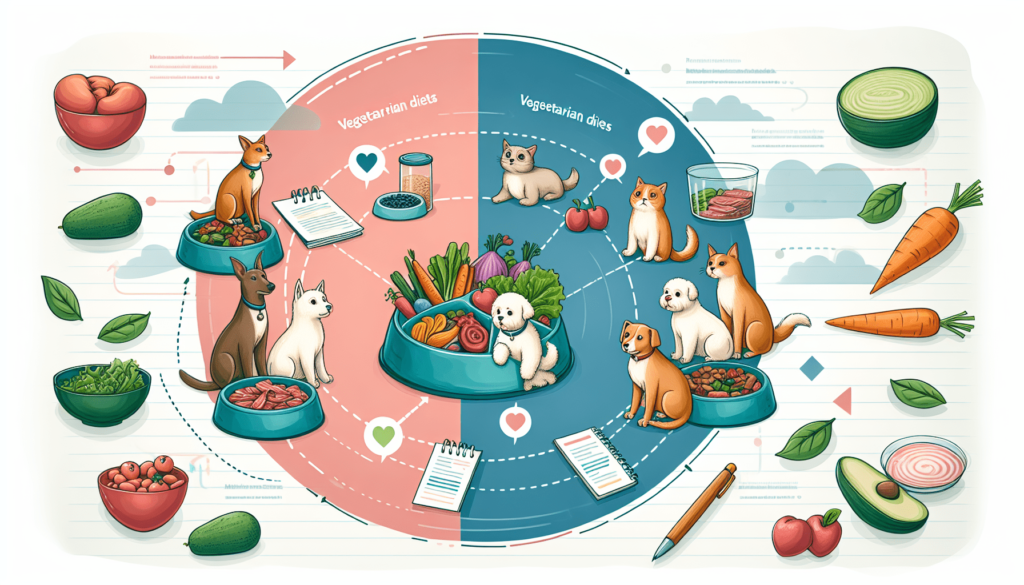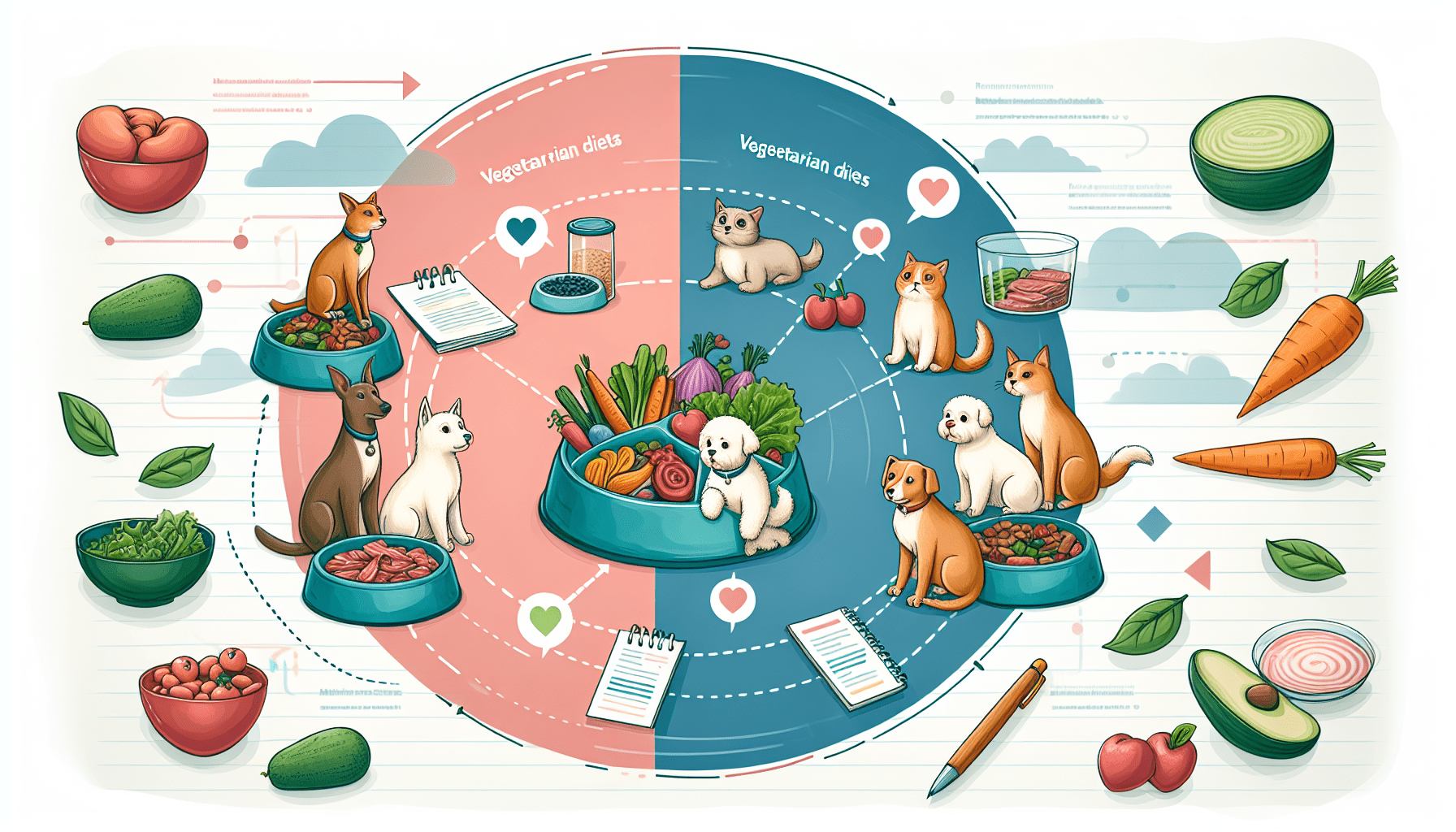Imagine being able to provide your beloved pet with a diet that aligns with your own ethical choices and values. The development of vegan and vegetarian diets for pets offers an exciting and compassionate alternative to traditional meat-based diets. Not only can these diets provide the necessary nutrition for your furry companion, but they also contribute to reducing animal cruelty and helping the environment. In this article, we will explore the growing popularity of vegan and vegetarian diets for pets, the benefits they offer, and the considerations to keep in mind when adopting such a diet for your four-legged friend.

Introduction
As more people embrace ethical and sustainable lifestyles, the demand for vegan and vegetarian diets has extended beyond human nutrition to the diets of our beloved pets. This article aims to explore the rise of vegan and vegetarian diets for pets, the nutritional needs of animals, the development of vegan and vegetarian pet foods, the benefits of these diets, controversies and criticisms surrounding them, as well as practical tips for choosing nutritionally complete vegan and vegetarian pet food.
The Rise of Vegan and Vegetarian Diets for Pets
Reasons for the growth of vegan and vegetarian diets for pets
The increasing popularity of vegan and vegetarian diets for pets can be attributed to various factors. Many pet owners choose these diets for ethical reasons, aiming to reduce animal suffering and promote a more compassionate lifestyle. Moreover, concerns about the environmental impact of animal agriculture have also motivated pet owners to explore plant-based options for their furry friends.
Benefits and potential risks of vegan and vegetarian diets for pets
Vegan and vegetarian diets for pets offer a range of potential benefits. These diets can often be more sustainable and environmentally friendly, as they require fewer resources to produce. Additionally, some studies suggest that plant-based diets can alleviate certain health conditions in pets, such as allergies. However, there are also potential risks associated with these diets, including the risk of nutrient deficiencies if not properly formulated and monitored.
Increasing availability of vegan and vegetarian pet food options
With the growing popularity of vegan and vegetarian diets for pets, the market has responded by offering a wider range of plant-based pet food options. Many reputable pet food brands now offer vegan and vegetarian formulations, making it easier for pet owners to find suitable and nutritionally complete diets for their furry companions.
Understanding the Nutritional Needs of Pets
Essential nutrients for pets
Pets require a balanced diet that provides essential nutrients to support their growth, development, and overall health. These nutrients include proteins, carbohydrates, fats, vitamins, minerals, and water. Meeting these nutrient requirements is crucial for maintaining the optimal well-being of pets.
Differences in nutritional requirements between dogs and cats
While both dogs and cats are carnivorous by nature, their nutritional requirements differ. Dogs are omnivorous and can thrive on a well-formulated vegan or vegetarian diet. However, cats have specific dietary needs, including taurine, an amino acid found predominantly in animal tissues. Meeting these unique requirements presents challenges when considering vegan or vegetarian diets for cats.
Challenges of meeting nutrient requirements with plant-based diets
One of the main challenges of feeding pets a vegan or vegetarian diet is ensuring that all essential nutrients are adequately provided. While plant-based sources can often meet the protein requirements of dogs, other essential nutrients, such as vitamins B12 and D, as well as omega-3 fatty acids, may be deficient in plant-based diets. Careful formulation and regular monitoring are essential to prevent nutrient deficiencies.
Development of Vegan and Vegetarian Pet Food
Research and formulation of balanced plant-based diets for pets
Extensive research and development have led to the formulation of balanced plant-based diets for pets. Experts in animal nutrition work closely with veterinarians to ensure that these diets meet all essential nutrient requirements. The goal is to create nutritionally complete and balanced food options that can provide the necessary nutrients for pets while adhering to vegan or vegetarian principles.
Incorporation of alternative protein sources
To meet the protein needs of pets on vegan or vegetarian diets, alternative protein sources such as peas, lentils, and soy are often utilized. These sources can provide a suitable amino acid profile and can be used as substitutes for animal-based proteins. Careful consideration is given to the digestibility and bioavailability of these sources to ensure optimal nutrient absorption.
Supplementation of essential nutrients in vegan and vegetarian pet food
In cases where certain essential nutrients are lacking in plant-based diets, pet food manufacturers often incorporate supplements to ensure nutritional adequacy. For example, vegan pet foods may be fortified with essential vitamins and minerals, such as vitamin B12 and taurine, to compensate for the absence of these nutrients in plant-based ingredients.

Benefits of Vegan and Vegetarian Diets for Pets
Reduced environmental impact
By choosing a vegan or vegetarian diet for their pets, pet owners can contribute to the reduction of the environmental impact associated with animal agriculture. The production of plant-based pet food generally requires fewer resources, such as land, water, and energy, compared to animal-based pet food production.
Potential for improved animal welfare
Vegan and vegetarian diets for pets align with the ethical principles of many pet owners who choose these diets for their pets. By avoiding animal products, pet owners can help reduce the demand for animal farming and potentially improve the welfare of animals involved in the food industry.
Management of certain health conditions
Studies have shown that vegan and vegetarian diets can be beneficial for the management of certain health conditions in pets. For example, dogs with allergies or sensitivities to specific animal proteins may experience relief when switched to a well-formulated plant-based diet. However, it is important to note that individual pet’s health needs may vary, and consultation with a veterinarian is crucial before implementing any dietary changes.
Controversies and Criticisms
Concerns about nutrient deficiencies
One of the primary concerns surrounding vegan and vegetarian diets for pets is the potential for nutrient deficiencies. Without proper formulation and monitoring, pets may be at risk of inadequate intake of essential nutrients, particularly those less abundant in plant-based diets. Vigilance and regular veterinary consultations are necessary to ensure that pets on these diets receive all the necessary nutrients.
Debates around ethical considerations
The ethics of feeding animals a vegan or vegetarian diet spark spirited debates within the veterinary community and among pet owners. While some argue that animals have evolved to require certain nutrients found only in animal-based diets, others advocate for the ethical reasoning behind avoiding the use of animal products. These debates reflect the ongoing question of whether it is possible to meet the nutritional needs of pets without using animal-derived ingredients.
Disagreements within the veterinary community
As with any topic, there are differing opinions within the veterinary community regarding the suitability of vegan and vegetarian diets for pets. While some veterinarians support the potential benefits and viability of these diets, others express caution and concern about the potential risks and challenges. Pet owners are advised to consult with a veterinarian who is knowledgeable about plant-based diets for pets to make informed decisions.
Feeding Vegan and Vegetarian Diets to Dogs
Guidelines for transitioning dogs to plant-based diets
When transitioning dogs to a vegan or vegetarian diet, it is important to do so gradually. Sudden dietary changes can upset their digestive system. Slowly introduce plant-based foods while monitoring their response and well-being. A well-formulated vegan or vegetarian diet for dogs should provide the necessary nutrients for their optimal health.
Addressing specific nutritional needs of dogs
While dogs can thrive on vegan or vegetarian diets, it is crucial to address their specific nutritional needs. Essential nutrients, such as protein, omega-3 fatty acids, and certain vitamins, must be carefully balanced in their diets. Protein sources, such as legumes and soy, should be included in appropriate quantities to ensure optimal nutrition.
Monitoring and adjusting the diet to ensure adequacy
Regular monitoring of a dog’s health and nutritional status is important when feeding a vegan or vegetarian diet. This includes periodic check-ups, blood tests, and consultation with a veterinarian. Adjustments to the diet may be necessary based on individual needs and any nutrient deficiencies that may arise.
Feeding Vegan and Vegetarian Diets to Cats
Challenges of feeding plant-based diets to cats
Unlike dogs, cats are obligate carnivores, meaning they have specific dietary requirements that must be met for optimal health. Feeding cats a vegan or vegetarian diet presents significant challenges due to their need for specific nutrients, such as taurine, which is typically found in animal tissues. Careful consideration and monitoring are crucial when considering a plant-based diet for cats.
Taurine supplementation and other considerations
Cats require taurine, an amino acid essential for their overall well-being. Since taurine is predominantly found in animal tissues, its supplementation is necessary in vegan or vegetarian diets for cats. Care should be taken to provide adequate taurine levels through appropriate supplementation, as deficiency can lead to serious health issues in cats.
Strict monitoring of health and nutrient levels
Feeding cats a vegan or vegetarian diet requires strict monitoring of their health and nutrient levels. Regular veterinary check-ups and blood tests are essential to ensure that cats are receiving all the necessary nutrients for optimal health. If any deficiencies or health concerns arise, adjustments to the diet may be needed in consultation with a veterinarian.
Tips for Choosing Nutritionally Complete Vegan and Vegetarian Pet Food
Reading and understanding pet food labels
When selecting vegan or vegetarian pet food, it is important to carefully read and understand the labels. Look for products that are labeled as nutritionally complete and balanced. Ensure that the ingredients list includes all essential nutrients and that it does not contain any potential allergens or harmful additives.
Identifying reputable vegan and vegetarian pet food brands
To ensure the quality and nutritional adequacy of the pet food, it is essential to choose reputable brands. Research and identify companies that specialize in vegan or vegetarian pet food and have a good track record of producing nutritionally complete products. Online reviews and recommendations from other pet owners can also help in determining reputable brands.
Consulting with a veterinarian for recommendations
Before making any dietary changes for your pet, it is essential to consult with a veterinarian who is knowledgeable about vegan or vegetarian diets for pets. They can evaluate your pet’s specific needs and provide recommendations based on their health, age, breed, and individual requirements. A veterinarian’s guidance is invaluable in ensuring your pet’s well-being and nutritional adequacy.
Conclusion
The development of vegan and vegetarian diets for pets has gained momentum due to ethical, environmental, and health concerns. While these diets offer potential benefits, such as reduced environmental impact and improved animal welfare, they also present challenges and controversies. Careful formulation, regular monitoring, and consultation with a veterinarian are essential to ensure that pets receive all the necessary nutrients when following a vegan or vegetarian diet. With proper consideration and guidance, pets can thrive on plant-based diets, promoting a compassionate and sustainable lifestyle for both humans and animals.

